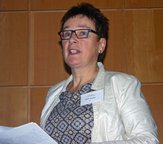Filling the gaps in IPM research and knowledge exchange
The ERA-net C-IPM is setting the stage for a coordinated effort to prepare calls for research and knowledge exchange in integrated pest management (IPM) in Europe. Existing research, infrastructures and capacities in Europe have been mapped and analysed.

The ERA-net C-IPM is moving along and has now reached the stage where topics for calls are being chosen. The latest activity was the annual meeting of C-IPM held in Carcavelos, Portugal, 26-28 November 2014. At this meeting 48 participants from 20 European countries were gathered to direct European research and knowledge exchange regarding IPM toward efficient research collaboration.
Prior to the meeting the existing European IPM research, infrastructure and capacity landscape in the partner countries had been mapped and analysed. This set the stage for identifying core themes and engaging in the identification of call topics for research and knowledge exchange.
IPM on the national agendas
Silke Dachbrodt-Saaydeh from Julius Kühn Institute in Germany presented the mapping and analysis of existing research based on future needs. The overall aims are to identify overlaps, gaps and opportunities for better coordination and joint initiatives, to share outputs from existing IPM-related research programmes, and to identify areas from which successful IPM experience can be applied in areas beyond their areas of origin.

The results are based on answers to a questionnaire that was sent to 37 national recipients in 21 countries in February 2014. Basically, the recipients were questioned about their countries’ existing national crop protection policies dedicated to pesticide use or risk reduction, and current or planned policy programmes dedicated specifically to IPM and their IPM-related short and long term research priorities.
At the annual meeting in Portugal the results of the questionnaire were used to feed into the list of possible research topics for the first and second research calls coordinated by C-IPM. The results will also feed into the Strategic Research Agenda and discussions regarding existing national R&D programmes, which will take place at the second C-IPM workshop on national R&D programmes to be held in Poznan, Poland on 13 January 2015 and the C-IPM Strategic Research Agenda workshop scheduled for 18 March 2015 in Paris.
A full report covering the results of the questionnaire and its conclusions will be written later.
In general, all the respondents replied that crop protection and IPM are pertinent on the national agenda, but there was a variation as to which policies there are, and how they are implemented. Most, but not all countries, have research programmes that support risk reduction or that are dedicated specifically to IPM.
The future prioritised research and development topics were listed. At the top of the list of priorities are decision support systems (DSS), pest monitoring systems (PMS), biological control, breeding for resistance and resistance management, non-chemical alternatives, and crop rotation but these are by no means the only topics of interest.
The survey also revealed which weaknesses are perceived. On a national level the respondents mentioned lack of budgets, insufficient knowledge transfer and lack of communication between different stakeholders. All the respondents agreed that coordinated research is essential for the progress of IPM in Europe.
Minor use needs
Wilma Arendse from Netherlands Food and Consumer Product Safety Authority, (NVWA) presented the results of the survey regarding minor uses. The aim of the C-IPM work on minor uses is to promote long-term sustainable IPM solutions.

Ten topics were identified as priorities in this area, including weeds in vegetables, various kinds of insects in fruits, berries, ornamentals and vegetables, and fungal diseases in leafy vegetables. IPM in fruits and vegetables was given a high priority as well as identifying weeds as a major problem to be dealt with. The needs that were identified coincide with the EU minor use priorities.
Transferring and applying knowledge
Mette Sønderskov from Aarhus University in Denmark presented an analysis of a survey regarding available IPM-related infrastructures and capacities in the partner countries. This area covers such things as extension services, demonstration farms, training, decision support systems and warning systems. The survey showed that most of the countries in question have demonstration farms, web-based tools and training programmes that support IPM or reduction of pesticide risks and use. The extent and content of these initiatives, however, varies broadly across the partner countries.

In most of the countries the demonstration or reference farms supporting IPM implementation include cereals, vegetables and orchards. Seven countries mentioned having long-term field experiments supporting IPM research. Most of the countries in the survey have some monitoring or forecasting systems, which overall cover a wide range of diseases, pests and crops, and most countries have IPM-related databases or platforms.
When asked which information and knowledge are required for implementation of IPM, the answers fell into seven categories, namely, demonstration, training/education, dissemination, decision support and warning systems, risk assessment and management systems, technology, and research.
Research in IPM and the coherence with topics selected for the calls will be further discussed at the C-IPM workshop in Poznan on13 January 2015.